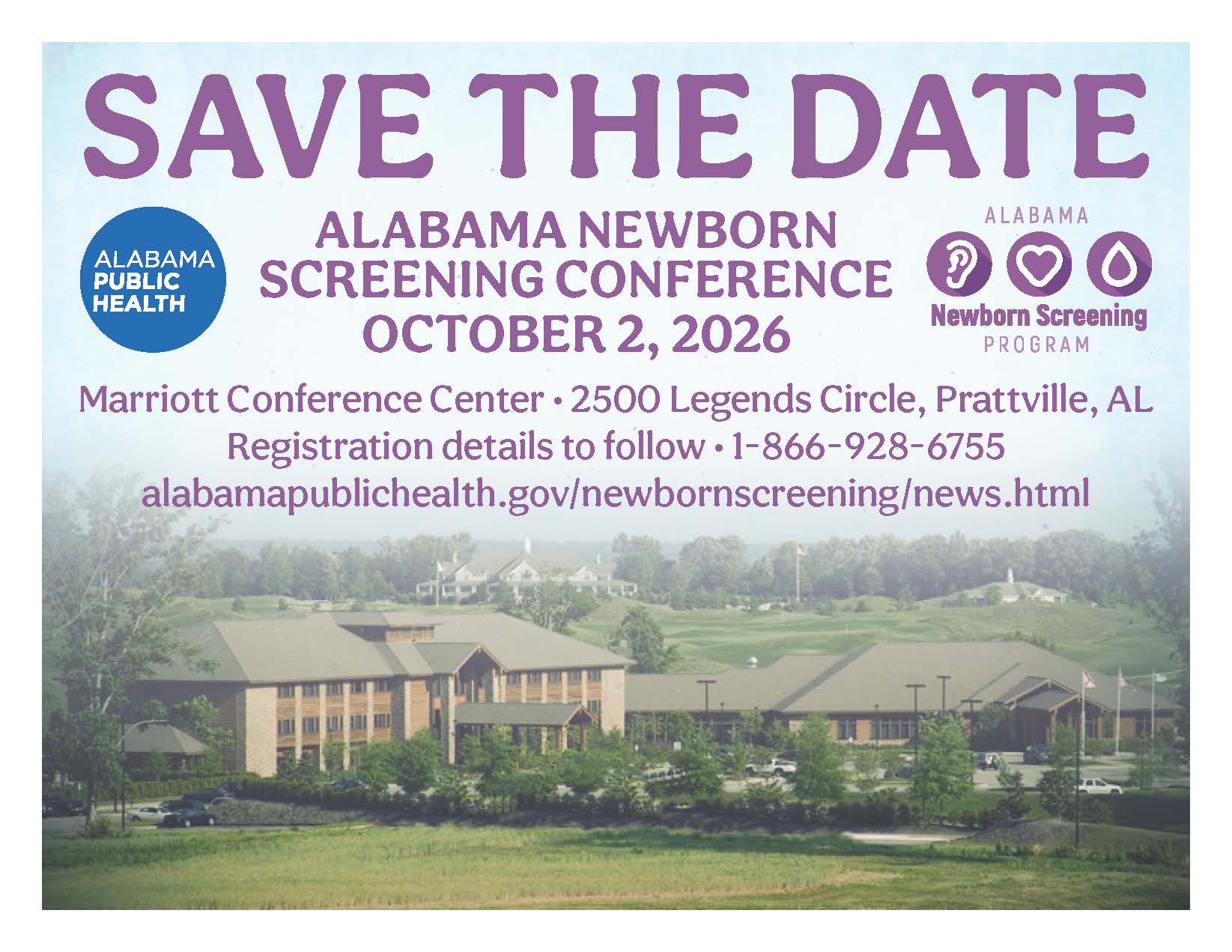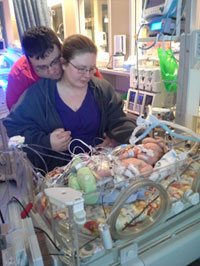News and Events
Save the Date: Newborn Screening Conference 2026
 The 2026 Alabama Newborn Screening Conference will take place in Prattville on October 2, 2026. Check this page soon for registration information and more details.
The 2026 Alabama Newborn Screening Conference will take place in Prattville on October 2, 2026. Check this page soon for registration information and more details.
Reporting Changes for Newborn Screening
Effective May 1, 2025, the Newborn Screening (NBS) Laboratory Division will no longer mail abnormal and/or unsatisfactory laboratory reports to providers designated as "Primary Care Physician" on the collection form. Ordering physician/submitting facilities will still continue to receive paper copies of all results.
All newborn screening providers can view results via the Secure Remote Viewer (SRV). If you do not have access to the SRV, please follow the instructions. If you have questions, contact the Newborn Screening Division at (334) 290-3097 or [email protected].
Alabama Begins Screening for Pompe and MPS-I
The Alabama Department of Public Health (ADPH) is excited to announce that on July 29, 2024, the Bureau of Clinical Laboratories began testing for Pompe disease and Mucopolysaccharidosis Type I (MPS I). The ADPH is partnering with the University of Alabama at Birmingham, Department of Genetics, to evaluate and confirm diagnosis for these two genetic disorders.
The addition of the two lysosomal storage disorders brings Alabama screening for 35 of 38 nationally recommended newborn screening conditions that are included in the Recommended Uniform Screening Panel. For additional information, please visit the Advisory Committee on Heritable Disorders in Newborns and Children.
New - Critical Congenital Heart Disease Screening (CCHD)
The American Academy of Pediatrics (AAP) has updated their clinical recommendations on the CCHD screening protocol for newborns. The simple, noninvasive screening using pulse oximetry has been part of the United States Recommended Uniform Screening Panel since 2011. It is currently required in all 50 states within the first 24 hours of life.
A clinical report containing the updates has been published in the Pediatrics January 2025 edition. The report, Newborn Screening for Critical Congenital Heart Disease: A New Algorithm and Other Updated Recommendations," includes endorsement of several new updates for health care providers as well as some other key takeaways from the first 14 years of national screening implementation.
Protocol updates reduce time from screening to intervention. The AAP recommendations refine the already successful protocol to ensure the screening is applied consistently, accurately, and efficiently.
Alabama Newborn Screening Conferences
Presentations and materials from previous conferences are now available.
- 2023 Newborn Screening Conference
- 2017 Newborn Screening Conference
- 2015 Newborn Screening Conference
- 2011 Newborn Screening Conference - Family Perspectives
Newborn Screening: Jase's Story
In honor of the 60th anniversary of newborn screening, the Oklahoma State Department of Public Health has created the following video highlighting how newborn screening saves lives.
Take a Virtual Laboratory Tour
Alabama Hospitals Recognized
Congratulations to the following hospitals for their outstanding effort in newborn screening specimen collection. They had 6% or less unsatisfactory newborn screening specimens during the period shown below. Their efforts set the gold standard for other facilities participating in newborn screening across the state.
January 2025
Athens-Limestone Hospital
Huntsville Hospital
Medical Center Enterprise
UAB St. Vincent's Birmingham
February 2025
Athens-Limestone Hospital
Cullman Regional Medical Center
D.W. McMillan Memorial Hospital
Huntsville Hospital
Medical Center Enterprise
UAB St. Vincent's Birmingham
March 2025
Bibb Medical Center
DeKalb Regional Medical Center
Grandview Medical Center
Huntsville Hospital
Marshall Medical Center South
Medical Center Enterprise
Russell Medical Center
UAB St. Vincent's Birmingham
UAB Women & Infants Center
April 2025
Athens-Limestone Hospital
Bibb Medical Center
D.W. McMillan Memorial Hospital
Huntsville Hospital
Medical Center Enterprise
Russell Medical Center
UAB St. Vincent's Birmingham
UAB Women & Infants Center
May 2025
Andalusia Health
Athens-Limestone Hospital
Baptist Medical Center East
Bibb Medical Center
Huntsville Hospital
UAB St. Vincent's Birmingham
UAB Women & Infants Center
June 2025
Athens-Limestone Hospital
Bibb Medical Center
Coosa Valley Medical Center
Huntsville Hospital
Medical Center Enterprise
Russell Medical Center
UAB St. Vincent's Birmingham
UAB Women & Infants Center
July 2025
Athens-Limestone Hospital
Huntsville Hospital
UAB St. Vincent's Birmingham
UAB Women & Infants Center
August 2025
Andalusia Health
Baptist Medical Center East
DeKalb Regional Medical Center
Helen Keller Hospital
Huntsville Hospital
Marshall Medical Center North
North Alabama Medical Center
Russell Medical Center
UAB St. Vincent's Birmingham
UAB Women and Infant's Center
Walker Baptist Medical Center
September 2025
Andalusia Health
Athens Limestone Hospital
Coosa Valley Medical Center
Huntsville Hospital
Medical Center Enterprise
Russell Medical Center
UAB St. Vincent's Birmingham
UAB Women and Infant's Center
October 2025
Andalusia Health
Baptist Medical Center East
D.W. McMillan Memorial Hospital
Grandview Medical Center
Highlands Medical Center
Huntsville Hospital
North Baldwin Infirmary
Northport Medical Center
Russell Medical Center
UAB St. Vincent's Birmingham
UAB Women and Infant's Center
November 2025
D.W. McMillan Memorial Hospital
Grandview Medical Center
Highlands Medical Center
Huntsville Hospital
North Alabama Medical Center
Northport Medical Center
Thomas Hospital
UAB St. Vincent's Birmingham
UAB Women and Infant's Center
Newborn Screening Mobile Applications Available
Several free mobile applications are available for newborn screening providers and parents. One app available for medical providers is through the American College of Medical Genetics (ACMG). This app allows users to access ACT Sheets, which provide short-term actions a healthcare provider should follow in communicating with the family and determining the appropriate steps in the follow-up of an infant with a positive newborn screening result.
Family Highlight: Newborn Screening Saved My Baby's Life

First-time parents Kyle and Leslie Ethridge had an uneventful pregnancy and birth of their first child Grayson in December 2012. Grayson was evaluated by his pediatrician after delivery, and the new parents were told everything was fine. The night before they were scheduled to leave the hospital the nurse took Grayson for routine vital signs and also performed the pulse oximetry screen, which revealed a 97% oxygen saturation in his right hand and an 87% oxygen saturation in his foot.
Grayson was quickly transferred to Baptist Medical Center South and then flown to Birmingham for open heart surgery. He was diagnosed with ventricular/atrial septal defect and an interrupted aortic arch. Grayson sees a pediatric cardiologist on a regular basis and has had superb news every visit. According to Mrs. Ethridge, "Family, friends, and faith kept us sane during this trial. We have come out stronger and are very proactive in raising awareness for pulse ox screening to detect congenital heart defects. Newborn screening saved my baby's life."
Page last updated: February 3, 2026




